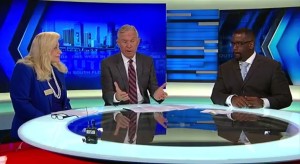Over the weekend, Fedrick Ingram, the leader of one of the largest urban teachers unions in the country and vice president of the Florida Education Association, took to a Miami television station to explain why his organization supports a lawsuit challenging tax credit scholarships for 78,000 low-income students.
During the most recent episode of “This Week in South Florida,” Ingram told host Michael Putney what he believes public education needs. “We need a system of fairness,” he said. “We need a system of fair access, and we need resources, and these resources are precious and scarce.”

His words underpin some of the strongest arguments in favor of Florida’s tax credit scholarships, the largest private school choice program in the country. The scholarships support “fair access” to private schools for low-income students whose families would not have been able to afford them. Studies by legislative analysts and state economists have repeatedly shown they save taxpayers money — helping to preserve “precious and scarce” funding for public schools. Step Up For Students, which publishes this blog, helps administer the scholarships.
During the 2014-15 school year, a scholarship was worth $5,272. Combining all expenses — including capital costs and debt service — the average school district spent $10,156 per student that year. The resulting savings can help public schools improve their service to the 2.7 million students who rely on them.
Ingram was joined on the broadcast by Sharon Glickman, the leader of Broward County’s local union. She endorsed efforts to create what she called “priority schools.” Also known as community schools, they’ve been promoted nationally by teachers unions as a way to help low-income children by offering wraparound services like medical and dental care, counseling and after-school tutoring.
Perhaps the most well-known such effort in Florida is Evans Community School, in the Central Florida neighborhood of Pine Hills. The school, once at the brink of closure, is attracting more students and improving its academic performance. It sits in the middle of the ZIP code 32808 — which is home to roughly 900 students receiving tax credit scholarships, the single heaviest concentration in the state.
Hundreds of low-income students in the Orlando area have benefited from the services Evans now provides, while hundreds more are thriving at private institutions, like St. Andrew Catholic School, right down the street. When it comes to expanding opportunities for low-income students, more hands make for lighter work.
Ingram, a onetime Miami-Dade County teacher of the year, noted student achievement is on the rise in South Florida public schools. He’s right about that. He acknowledged that some parents still seek options outside the public school system, but he raised two other objections to the scholarship program – one legal, and one philosophical.
He argued tax credit scholarships, created in 2001, are a “spin-off” from a voucher program found unconstitutional in 2006 by the Florida Supreme Court. That simply isn’t the case. He also said that while parents have long sought private and parochial schools, his organization opposes programs that allow people to bring “public dollars into private institutions.”
Setting aside the legal dispute around the definition of public dollars, that philosophical difference is worthy of debate. The dispute, though, is not about supporting private options at the expense of public education; fifteen years of experience in Florida show the two can work hand in hand. The question, rather, is what measures are appropriate to ensure that private education is not just a luxury reserved for the wealthy.
Those who support private school choice believe we need a system of fairness.


